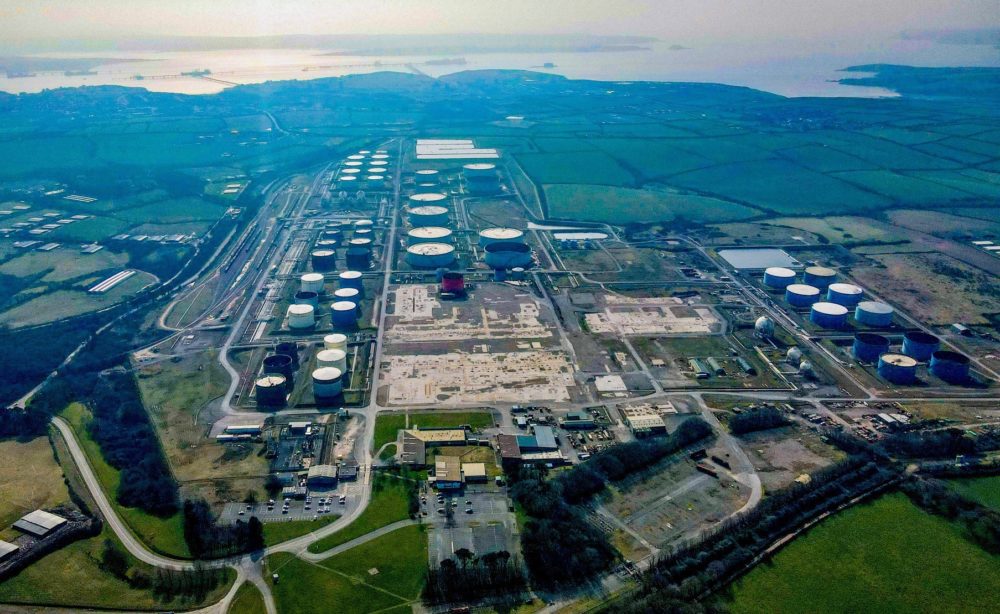Major hydrogen fuel project planned for former oil refinery

Bruce Sinclair, local democracy reporter
A major hydrogen fuel generation scheme, which could make up to five tonnes of the gas a day at the site of a former oil refinery, has been backed by council planners.
Viktor Carp of H2 Energy Ecosystem UK Limited sought permission for the erection of an electrolysis hydrogen generation facility and associated storage facilities and works at the former Puma Energy site in Milford Haven.
The brownfield site, previously known as the Milford Haven Refinery, has been empty since refinery use ended in 2014 with its demolition.
The 20MW hydrogen generation plant on the 1.7-hectare site would generate, on average, five tonnes of hydrogen a day; the electricity coming from the substation on site, using green electricity from UK windfarms.
Electrolysis
The technology uses the electrolysis of water to split into its constituent elements, hydrogen and oxygen; the end product is hydrogen gas, which can be used for fuel cells in cars, fuel for engines and turbines, or as liquid fuel for planes and lorries.
H2 Energy Europe Ltd was established in 2014 in Zurich as a joint venture between Trafigura (landowner Puma Energy’s largest shareholder) and H2 Energy Holdings, with the goal to make hydrogen generated from renewable energy a mainstay of energy systems.
A planning statement accompanying the application said: “South Wales is an ideal location for a proposed hydrogen generation plant, to make use of the existing renewable energy assets and Pembrokeshire’s emerging status as a key location for clean energy investment.
“Milford Haven is home to the UK’s largest energy port and offers great opportunity for a transition to a low carbon economy, to meet Wales and the UK’s decarbonisation goals.”
It added: “The hydrogen generated from the site will be used to supply industrial clusters in Milford Haven, Port Talbot and other sites in Wales, in addition to green transport such as trucks and tugboats. The end use of the hydrogen generated will be driven by market demand.”
The project, conditionally approved by county planners, has been shortlisted for funding under the UK government’s Hydrogen Business Model and Net Zero Hydrogen Fund: Electrolytic Allocation Round 2022 and selected to progress to the negotiation stage as part of the Net Zero Hydrogen fund.
The final projects selected are expected to be announced in the last quarter of this year.
Subject to government support, H2 Energy’s 20 MW electrolytic hydrogen production facility is expected to be commissioned within two years, creating 17 high-skilled jobs.
Support our Nation today
For the price of a cup of coffee a month you can help us create an independent, not-for-profit, national news service for the people of Wales, by the people of Wales.







Take this process to scale and the internal combustion engine will be able to become completely clean. Even existing engines can be converted for use with hydrogen, as the drive technology is basically the same. BMW and some other Continental motor manufacturers are shrewdly continuing to invest in ICE, at the same time as they are diversifying into electric vehicles, as they can see a real future for hydrogen powered vehicles. What a pity this government has destroyed any future for ICE production in Britain with its enforced screeching u-turn towards the total banning of diesel and petrol cars within… Read more »
Hydrogen is not a suitable fuel for domestic vehicles. It’s a highly volatile gas that’s difficult to safely contain. It’s expensive to generate, expensive to store, and expensive to distribute. It would take a massive amount of investment and time to produce refuelling systems that are safe for use by the general public – generally, Mr & Mrs Average aren’t trained in handling volatile flammable gases. The storage and distribution network required to keep hydrogen fuel stations in operation would be extremely expensive. It’s a poor source of fuel for your car, and a hideously inefficient way to produce electricity.… Read more »
And yet Eltis, a major think-tank in the field of sustainable urban mobility in Europe, includes this in a recent report: ‘The UK Government has announced that it is supporting Monmouthshire County Council in Wales and a local manufacturer of hydrogen fuel cell vehicles to establish a fleet of 20 hydrogen cars. The project is one of five grants awarded in the UK, which aim to boost the zero-emission vehicle sector by providing £14 million of funding for hydrogen fuel cell vehicle and hydrogen refuelling infrastructure projects. Monmouthshire County Council and manufacturer Riversimple were awarded £1.25m from the UK Department for Transport to build… Read more »
Storing *liquid* hydrogen requires an extremely safe and extremely well designed pressure vessel – it is quite literally a bomb in potentia. The hydrogen in that fuel cell will run out, and need to be either refilled or the fuel cell replaced. So you still come back to that question of how does the average person safely refill their car with hydrogen? Hydrogen as a means to power consumer vehicles has absolutely terrible end-to-end efficiency. It takes a hell of a lot of electrical power to generate the hydrogen in the first place, and then it has to be safely… Read more »
Fuel cell technology is totally different from ICE technology, and so the Eltis report has no bearing on the issue of Hydrogen powered ICE engines.
Burning hydrogen in an internal combustion engine would not be “completely clean”. It will still produce NOx emmissions.
I just wander where the water will come from. Will it be fresh or sea water used?